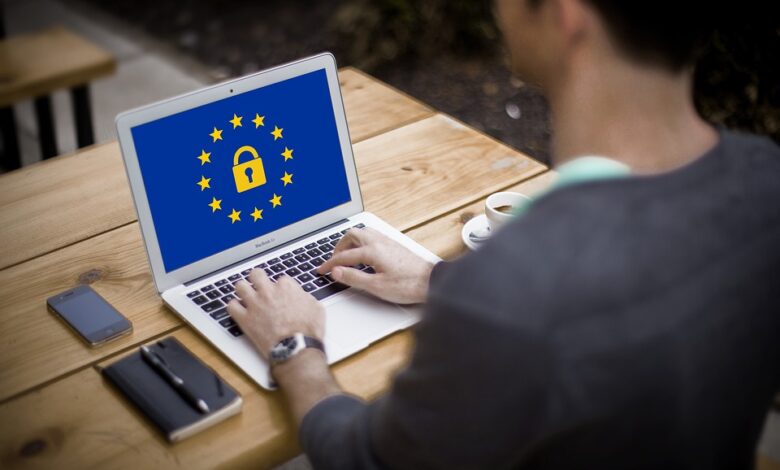Major US tech companies are facing new EU regulations

[ad_1]
CNN
—
The world’s largest tech companies must comply with a sweeping new European law that begins on Friday and affects everything from social media oversight to targeted advertising and counterfeit goods in e-commerce — with potential ripple effects for the rest of the world.
The EU’s unprecedented measures for online platforms will apply to companies including Amazon, Apple, Google, Meta, Microsoft, Snapchat and TikTok, among many others, reflecting one of the most comprehensive and ambitious efforts by policymakers anywhere to regulate tech giants from through legislation. This could result in fines for some companies and changes in programs affecting consumers.
The rules seek to address some of the more serious concerns that critics of big tech platforms have raised in recent years, including the spread of disinformation and disinformation; potential harm to mental health, especially for young people; significant holes in algorithmically recommended content and lack of transparency; and the proliferation of illegal or counterfeit products in virtual marketplaces.
although EU Digital Services Act (DSA) Last year has passed, and companies have yet to prepare to implement it. Friday marks the arrival of the key compliance deadline — after which tech platforms with more than 45 million users in the EU will have to meet the obligations laid out in the law.
The EU also says the law aims to “create a level playing field to promote innovation, growth and competitiveness in the European single market and globally”. This measure reinforces Europe’s position as a leading country in checking the power of major American technology companies.
For all platforms, not just the largest ones, the Digital Advertising Act prohibits targeted, data-based ads targeting children, as well as ads directed at all internet users based on protected characteristics such as political affiliation, sexual orientation, and ethnicity. The restrictions apply to all types of online ads, including commercial ads, political ads, and issue ads. (Some platforms have already in recent years restricted ad targeting based on protected characteristics.)
The law prohibits so-called “dark patterns,” or the use of subtle design cues that may be intended to lead consumers to give up their personal data or to make other decisions a company might favor. An example of a dark pattern commonly cited by consumer groups is when a company attempts to persuade a user to opt-in to tracking by highlighting the accept button in bright colours, while minimizing the opt-out option by reducing the font size or position of that choice .
The law also requires all online platforms to provide ways for users to report illegal content and products and for them to appeal content moderation decisions. It requires companies to articulate their terms of service in an accessible manner.
For larger platforms, the law goes further. Companies rated as Very Large Internet Platforms or Very Large Internet Search Engines will be required to conduct independent risk assessments that focus, for example, on how bad actors may attempt to manipulate their platforms, or use them to interfere with elections or violate human rights – and companies must act to mitigate those risks. They will have to create repositories of the ads they have run and allow the public to sift through them.
Only a few companies are considered platforms that are too big by law. But the The listing was completed in April It includes the most powerful technology companies in the world, and for these companies, breaches can be very expensive. The DSA allows EU officials to issue fines of up to 6% of global annual revenue for a platform that is too large. That could mean fines in the billions for a company as big as Mita, which was signed last year Recorded more than 116 billion dollars in revenue.
The companies spent months preparing for the deadline. As recently as this month, TikTok roll out tool to report illegal content and said it would give EU users specific explanations when their content was removed. It also said it would stop showing ads to teens in Europe based on the data the company had collected on them, all to comply with DSA rules.
“We’ve introduced new processes and features to provide greater transparency around our approach to advertising, content moderation, and recommendation systems — and ultimately, giving users more control over their TikTok experience,” TikTok spokesperson Morgan Evans said in a statement, adding. That the company will continue to invest “for our global community as well.”
said META Head of Global Affairs Nick Clegg In a statement Tuesday that the company “has been supportive of the goals of the DSA and the creation of a regulatory system in Europe that minimizes harm”. Clegg, who is also a former deputy prime minister of the UK, said Meta had assembled a team of 1,000 people to prepare for the DSA requirements.
He outlined several of the company’s efforts including limits on what data advertisers can see about teens ages 13-17 who use Facebook and Instagram. He said advertisers can no longer target teens based on their activity on those platforms. “Age and location are now the only information about teens that advertisers can use to show ads to them,” he said.
In a statement, a Microsoft spokesperson told CNN that the DSA deadline “is an important milestone in the fight against illegal content online.” We are aware of our growing responsibilities in the EU as a major technology company and continue to work with the European Commission to meet DSA requirements.
on Fri blog postCourtney Gregoire, Chief Digital Safety Officer at Microsoft, explained how the company is strengthening security in its Bing search engine to comply with the law.
Snapchat, Snapchat’s parent company, told CNN that it is working closely with the European Commission to ensure the company complies with the new law. The company said that Snap has hired many dedicated compliance officers to monitor whether it is meeting its obligations, and has already implemented several safeguards.
In a statement, Apple said the DSA’s goals “are consistent with Apple’s goals to protect consumers from illegal and harmful content. We work to implement the requirements of the DSA with user privacy and security as our continuing north star.”
Google and Pinterest told CNN that they are working closely with the European Commission.
A Google spokesperson said: “We share the DSA’s goals of making the Internet safer, more transparent and accountable, while making sure European users, creators and businesses continue to enjoy the benefits of the web.”
A Pinterest spokesperson said the company “will continue to work with the European Commission on DSA implementation to ensure a smooth transition to the new legal framework.” “The well-being, safety and privacy of our users is a priority and we will continue to build on our efforts,” the spokesperson added.
Many companies should be able to comply with the law, given their existing policies, teams and monitoring tools, according to Robert Grosvenor, managing director of London-based consultancy Alvarez & Marsal. “The largest online service providers in Europe are not starting from scratch,” Grosvenor said. But, he added, “whether they are ready to transition into a highly regulated sector is another matter.”
EU officials have indicated that they will check the companies for violations. Earlier this summer, European officials conducted preemptive “stress tests” of X, the company formerly known as Twitter, as well as Meta and TikTok to determine the companies’ readiness for a digital services agreement.
For most of the year, EU Commissioner Thierry Breton publicly reminded X of its upcoming commitments as the company rolled back some of its content moderation practices. Even when Breton deduced that X was Take stress testing seriously In June, the company had just I lost a chief content moderator It pulled out of a voluntary EU commitment on disinformation that European officials said would be part of any assessment of the platform’s compliance with the Digital Services Act.
X told CNN before Friday’s deadline that he is on track to comply with the new law.
Analysts expect the EU to watch closely after the deadline — and some hope the rules will encourage tech platforms to voluntarily replicate their EU practices around the world or prompt policymakers to adopt similar measures.
“We hope these new laws will inspire other jurisdictions to act, because these are, after all, global companies applying many of the same practices around the world,” said Agustin Reyna, head of legal and economic affairs at BEUC, a European consumer advocacy group. . “Europe is starting to act, but we need other jurisdictions to win the game against the tech giants.”
Indeed, Amazon has sought to challenge The platform’s too big mark in court, arguing that the DSA’s requirements are geared toward ad-based online speech platforms, that Amazon is a retail platform and that none of its direct competitors in Europe are rated similarly, despite being larger than Amazon among individual countries European Union.
The legal battles could represent the first major test of the DSA’s resilience against the vast resources of Big Tech. Amazon told CNN that it plans to comply with the EU General Court’s decision, either way.
An Amazon spokesperson said: “Amazon shares the European Commission’s goal of creating a safe, predictable and reliable online environment, and we invest heavily in protecting our store from bad actors and illegal content and in creating a shopping experience that is trustworthy.” “We have built on this strong foundation of DSA compliance.”
[ad_2]
Source link




